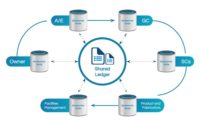 |
| Dan Robles |
Dan Robles served as chairman of the 2016 Financial Technologies task force for the National Society of Professional Engineers to research and create a whitepaper on incorporating blockchain technology within the engineering profession. A professional engineer licensed in two states, Robles is the owner of Coengineers, PLLC, director of The Ingenesist Project and founder of the Integrated Engineering Blockchain Consortium. ENR Deputy Editor Richard Korman spoke with Robles about his ideas of how engineers can participate in new economic relationships in a world of rapidly emerging decentralized business platforms.
ENR You have devoted a lot of time and thought to considering engineering's role in the economy and the future of the profession, especially since Bitcoin made blockchain a well-known encryption technology.
Robles I've been at this for a while. The advent of the Internet and social media has culminated with the invention of the Blockchain Protocol - the ability to transfer value electronically. What Bitcoin accomplished may be considered one of the greatest inventions of human intellect since algebra. I believe that there lies a tremendous opportunity for engineering professionals and engineering firms, if we are clever and work together.
Why is it so important?
Cryptography has been around since World War II and even earlier. Bitcoin arrived in 2008 as an electronic cash system initially gaining popularity for illicit trade - until it was seen as a threat to banks for its ability to simulate money. At first the banks fought it tooth and nail, but now financial services are among the biggest investors in the underlying technology, Blockchain Protocol, and it's well into the billions of dollars. I believe that there are two main reasons for this: banks are trying to head off an upswell of competition and blockchain may allow them to surplus a lot of back office employees and brokers. Whatever impacts banks and insurance will surely impact engineering – we need to keep an eye on this.
And for engineering...?
A big problem with all of this that hasn't been solved is how do you represent a physical asset with a digital asset? At some point cryptocurrencies such as Bitcoin need to touch the ground. There will need to be a third party who verifies the existence, condition, and value of assets and who can flip the switch that allows that digital contract to execute. Guess what? That’s exactly what engineers already do. We have the ability to sustain an asset from virtual state to physical state in what we do with our PE stamp and what we do with banks and insurance companies. Now we have a digital stamp and the opportunity to adjudicate contracts executed on a blockchain.
Why are you so sure that engineers are part of this?
All securities must be backed by collateral or else they cease to exist. In essence, engineers define that collateral. However, we need to make ourselves part of this and nobody can do it for us. We need to re-imagine ourselves more as a financial instrument than an hourly service.
How about a more concrete example?
If I make observation about a site condition and enter that to a blockchain, that time stamp is immutable. Nothing can corrupt it, the assessment cannot be changed; it is durable, fast, and scales magnificently – but it is also very easy to audit. The marginal cost of each new participant or transaction is miniscule. This represents a high leverage position for the engineering profession.
Okay, I think I'm catching on.
Think of it this way: the economy is like a three-legged stool with one leg for banks, the other for insurance and the third for infrastructure. If you lose one, you lose the other two. But money can only represent human productivity. Productivity is the exclusive domain of engineers. We are the money.
What other ideas do you have?
I believe that we can create a cryptocurrency that represents engineering productivity. Such a token would represent value stored in public and private infrastructure and thus perform well in secondary markets.
When you addressed NSPE members in Seattle in 2015, someone asked you what NSPE should be doing. What did you say?
If engineers don't do this for theirselves, someone will happily do it for us – and we will remain stuck where we are. Or we do it our way and elevate the profession. NSPE is a very good platform to unify the profession and promote engineering blockchain applications.
Technological change is disruptive, in the way that Uber and Airbnb have disrupted those industries. Is there a threat to the customary ways of doing engineering business? Isn't what you have described just a series of attestations and notarizations?
Many engineering firms are asking themselves this exact question, "Where will the Uber of Engineering come from?" Blockchain is disruptive to hierarchy and centralized control. Everyone is vulnerable; NCEES [the National Council of Examiners for Engineering and Surveying] and state boards can be replaced with blockchain software. Municipal permit offices and corporate bureaucracy are also vulnerable. But the human component is still essential, just different. I believe it is better for them to adopt than contest, and that is our objective.
So a lot of what you say is about securing the future of engineering, right?
We have to span this bridge so we can walk across it to a new economy. Right now, decisions are being made about the physical world by non-engineers. We have to get to a new funding and compensation model because right now that model is over 100-years-old and from a world that no longer exists. We’re fighting each other for every penny. We're divided and conquered. Almost every profession takes a percentage of value, except engineering. Kids know this and they want a game that they can win playing by a clear set of rules. We are in position to give them that new platform, one that takes them where they want to go. If we can do this, I am confident they’ll create a future we can all be proud of.




.jpg?height=200&t=1626721303&width=200)

Post a comment to this article
Report Abusive Comment